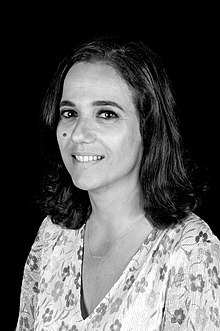| Jocelyne Bloch | |
|---|---|
 Jocelyne Bloch in 2019 Jocelyne Bloch in 2019 | |
| Born | 1971 (age 53–54) |
| Nationality | Swiss |
| Occupation(s) | Neurosurgeon Neuroscientist |
| Known for | Neurorehabilitation |
| Academic background | |
| Education | Medicine |
| Alma mater | Lausanne University |
| Thesis | (1994) |
| Academic work | |
| Discipline | Medicine |
| Sub-discipline | Neurosurgery |
| Institutions | Lausanne University Hospital EPFL (École Polytechnique Fédérale de Lausanne) |
| Main interests | Neurosurgery Deep brain stimulation Brain repair for movement disorders |
| Website | https://www.neurorestore.swiss |
Jocelyne Bloch (born 1971) is a Swiss neuroscientist and a neurosurgeon at Lausanne University Hospital and at EPFL (École Polytechnique Fédérale de Lausanne).
Life
Bloch graduated in the Faculty of Medicine of Lausanne University in December 1994 and she obtained her neurosurgical degree in 2002. Her area of expertise is deep brain stimulation and brain repair in relation to movement disorders. In collaboration with EPFL, she is currently leading a clinical feasibility study that evaluates the therapeutic potential of this spinal cord stimulation technology, without a brain implant, to improve the walking ability in people with partial spinal cord injury affecting the lower limbs.
Since 2019 she has also been an adjunct professor of neuroscience at EPFL. Since 2019, Bloch together with Grégoire Courtine, leads the .Neurorestore Laboratory, jointly managed by the Lausanne University Hospital, the University of Lausanne, the Defitech Foundation and the EPFL.
Bloch was awarded the Ronald Tasker Award (2019) of the World Society for Stereotactic and Functional Neurosurgery for her innovative research in neuromodulation and spinal cord repair.
Jocelyne Bloch and Grégoire Courtine were named in Time 2024 100 influential people in health list.
Paralysed but walking: Brain and spine implants help monkeys move again
The wireless brain and spine implants used could help paralysed people regain control of their bodies. Monkeys with spinal injuries that have left them paralysed are able to walk again through wireless implants in their brains and spines that bypass the damaged tissue. Scientists developed a brain-spinal interface to transmit neural signals from the brain to a site in the spinal cord downstream of the injury. Neurosurgeon Jocelyne Bloch of the Lausanne University Hospital, who surgically implanted the brain and spinal cord implants, says: "The link between the decoding of the brain and the stimulation of the spinal cord – to make this communication exist – is completely new".
References
- Brunschwig, Francine (15 January 2018). "Elle rêve de faire remarcher les paraplégiques". 24 heures (in French). Retrieved 9 February 2022.
- Gallagher, James (10 November 2016). "'Brain wi-fi' reverses leg paralysis". BBC News. Retrieved 9 August 2018.
- ^ "25 new professors appointed at the two Federal Institutes of Technology | ETH-Board". www.ethrat.ch. Archived from the original on 22 November 2020. Retrieved 15 February 2021.
- "Jocelyne Bloch". orcid. 10 November 2016. Retrieved 10 August 2018.
- "Jocelyne Bloch: After An Injury, Can The Brain Heal Itself?". NPR.org. Retrieved 9 August 2018.
- "Primates Regain Control of Paralyzed Limb". Laboratory Equipment. 10 November 2016. Retrieved 9 August 2018.
- "Jocelyne Bloch". people.epfl.ch. Retrieved 15 February 2021.
- Barraud, Emmanuel (12 May 2019). "NeuroRestore Center: aimed at restoring lost neurological function".
{{cite journal}}: Cite journal requires|journal=(help) - "NeuroRestore". NeuroRestore. Retrieved 15 February 2021.
- "WSSFN | Awards". wssfn. Retrieved 22 June 2022.
- Herbelin, Bruno (7 February 2019). "Prof Bloch wins the Tasker Prize 2019".
{{cite journal}}: Cite journal requires|journal=(help) - "TIME100 Health". TIME. Retrieved 19 September 2024.
- Henriques, Martha (9 November 2016). "The brain and spine implants that help paralysed monkeys walk again". International Business Times UK. Retrieved 9 August 2018.
External links
- "The brain may be able to repair itself – with help | Jocelyne Bloch". YouTube. TED. 7 March 2016.
- Jocelyne Bloch publications indexed by Google Scholar
- Website of .Neurorestore
- Swiss neurosurgeons
- Women neurosurgeons
- University of Lausanne alumni
- Living people
- Swiss women neuroscientists
- 21st-century Swiss physicians
- 21st-century Swiss women scientists
- 21st-century Swiss scientists
- 21st-century women physicians
- 1968 births
- Academic staff of the École Polytechnique Fédérale de Lausanne